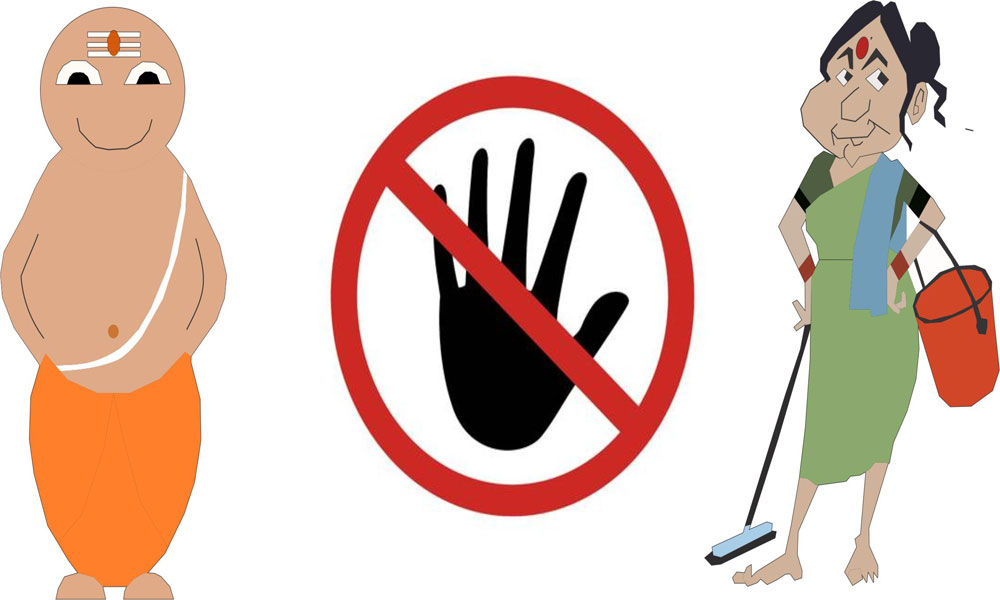Untouchability, although a cognizable offense in India, is still practiced covertly in several households. In the city of Bangalore, not sharing utensils and other items is just another assertion of the belief that ‘one who cleans my washroom can’t cook my food’.
By Yamini Chincholi
Imagine that you have just mopped up the utility where you work and the owner of the house has some business there, so she pours a bucket of water, making it all wet again so she can step on the floor now without getting “polluted”. The Softcopy spoke to four domestic workers who are faced with such behaviour every day at work. Madhavi, Ratnamma and Shivamma are victims of various subtle forms of untouchability.
The Two-Inch Rule
Madhavi works in three upper caste households in the localities near KSIT College. She is given breakfast or brunch most days at one household. “The owners are generous and kind-hearted. They have helped me financially in educating my children,” she said. But she noticed that her cup is kept in the shelf opposite to where the rest of the cups are. She is served tea only in that one cup. The same goes for her plate, bowl, and tumbler. “I have never been discriminated against by the lady of the house. But I see the small things like she won’t directly place something in my hand. She will drop it from a two-inch height. It’s subtle,” she added.
Clean Dishes Rinsed Before Use
Ratnamma does not work at any upper caste household but went to help out at one after a big festival. The first thing she saw was a huge pile of dirty dishes. It took her more than an hour to get them all clean and shiny. One of the ladies of the house wanted a tumbler from the clean pile. She rinsed it casually and took it to the kitchen. Ratnamma still wonders why it needed to be rinsed. “My friends talk about these things. But it was always just a funny story because it was a hypothetical situation for me. It’s not funny when it happens to you. To see your hard work be disregarded so casually. Dishes washed by us are rinsed before use in upper caste households. That’s just how it is. I knew that, but it didn’t sink in until it happened to me. It felt insulting,” she said.
Shivamma works in Brahmanara Beedhi in Kalidasa Layout, Srinagara. The street is situated near a Rayara Mutt. Most of the temple’s priests and devotees live in the street and lead ritualistic lives. Most homes have a well, and the residents bathe here before doing their pujas. Every time there is a puja, there is a huge gathering of people and Shivamma has to wash up huge piles of utensils – the big ones used to cook for fifty people. After she finishes through the pile, she has to watch one of the ladies of the house rinse and keep aside each one.
“It’s painful to watch. The ladies are so tired of attending to the guests and the puja, but then they have to rinse these humongous utensils. It’s sad. It is funny that they also face the consequences of having set hard rules. These customs are everywhere,” Shivamma said.
No Entry
The Softcopy visited six upper caste homes and found that housemaids are not allowed to enter kitchens and prayer rooms.
Where did untouchability originate from?
Mr. Prashanth of a gated community near KSIT College said, “Untouchability came in existence to maintain cleanliness, the objective of which is to free people from diseases and help them lead healthy lives. Even we are untouchables in front of God. Before a Shaligrama puja, we have to bathe twice in cold water no matter what temperature it is and perform the whole puja in clothes separate from our normal casual wear. The naivedyam (prasadam) is prepared on a coal stove, not on a gas one because it is considered impure. We have rules for ourselves too and we become eligible to touch God only when we follow all of them. We cannot just wear the same clothes we go to parties in to do pujas and cook on the stoves where we may have used onions to make prasadam. It is a system of discipline and cleanliness rather than discrimination. The concept was misinterpreted by historians and given communal colour for their petty benefit which the British conveniently exploited,” he explained.
Digging Deeper
Aravind Madabhavi, the co-founder of Madhwa Yuva Pratishthana (MYP), an NGO for propagating Madhwa philosophy through workshops and discourse, told The Softcopy one of the possible underlying reasons why untouchability is observed in subtle forms in Brahmin households. He stated that emphasis is on cleanliness and hygiene behind these practices as per our scriptures – rules.
“Most Madhwa Brahmin girls sit separately during their monthly cycles” – meaning they don’t go out to play, and don’t go to the kitchen and prayer rooms during this period. They are not allowed to touch anything in the house because “it is the period necessary for rest, both for health and hygiene. But the domestic workers don’t follow this practice, which is probably the reason why they are not encouraged to touch everything in the house and are kept at a distance during religious ceremonies despite being invited. All these practices are followed in our homes. However, no one is forcing domestic workers to follow and lead our lives,” he said.




Perfect response for untouchability , fentastic.
Well written, we are ok with leather belts and leather shoes made out of the skin of the cows which we very much worship! We are ok with a doctor touches us even if he is untouchable! Yes, cleanliness is required but not at the cost of others! What happens if a doctor from the upper caste practices untouchability? Will he survive in the world of competition? Hypocrites ….